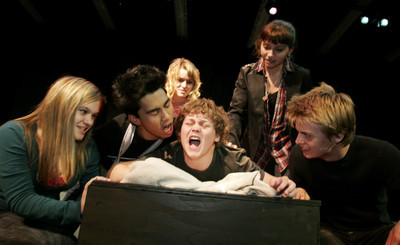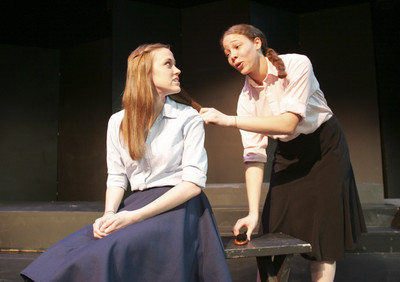Teen of the Crime
Theme: "It's Not Easy Being Teen."
Not six decades ago, when innocent teens considered their futures. Not now, when armed teens extinguish futures.
"We have teenagers just beginning to see the world, not cynical or jaded yet, but then 60 years later, we really see the cynicism being installed in teenagers," says John Morris, one of two directors who helmed a pair of one-act plays, "Ascension Day" and "Bang Bang You're Dead" -- the latter the debut of a rewritten 10-year-old school-shooting drama -- now playing at the Las Vegas Academy of International Studies, Performing and Visual Arts.
"What I'm hoping to show the audience is a balance between the good and the bad," says fellow director Dane Madsen. "It's a hopeful message to show, though it's kind of a dark, depressing theme."
Timothy Mason's "Ascension Day," set at a Wisconsin bible camp in 1947, focuses on two daughters of a diffident father, one finding in sex the approval and affection so far denied her by Dad, the other appearing unconcerned about such familial nourishment, but is in fact terrified of following her father into an emotional abyss. Symbolism seeps in via a mysterious lake and the first public rumblings of "flying saucers" spotted in the skies over America.
"That resonates throughout and represents the vast unknown future for these teenagers," Madsen says. "It's a look at teenagers stumbling into adulthood following World War II, but it still speaks to the teen of today. It's that need to become an adult, get away from the family, become their own person, much as Romeo and Juliet made mistakes as teenagers too much in a rush to grow up, the moment they're living in being lost."
"Bang Bang," just as deep but considerably darker, was written in 1998, before the 1999 massacre at Columbine High School (13 dead, 23 wounded) and the 2007 Virginia Tech blood bath (32 dead, many wounded in the worst mass murder by a lone gunman in U.S. history). William Mastrosimone ("Extremities") adapted his play into an Emmy-winning 2002 Showtime movie before he undertook an extensive rewrite.
"It's about 75 percent different, more streamlined and gets to the point in a much more dramatic way," says Mastrosimone, who is collaborating with Academy actors and directors. He wrote the original shortly after a 1998 incident at Thurston High School in Springfield, Ore. (two students dead, plus the shooter's parents, 25 wounded), a lesser-known prelude to Columbine.
"We tried to do the play in that town, and they didn't want it, understandably so," he says. "When I wrote it, people were not thinking kindly of the shooters, and the media went crazy with the same thing they always say about unexplained phenomena -- he was a loner, he was depressed. But I wanted to go into an area nobody was going into, which was the mind of the shooter. People thought I was trying to exploit the situation, but now they understand there's a need for this play."
"Bang Bang" zeroes in on Josh, an alienated teenager obsessed with violent video games, his grandfather's guns and his own intense loneliness and isolation before spraying bullets through a school lunchroom. Just before he began writing the play, Mastrosimone says, President Bill Clinton ordered the Secret Service to study the psychology of school gunmen to compile profiles administrators could use to identify them to avert tragedy and get them counseling. The results were a disturbing creative motivation in that they offered no easy, quantifiable answers.
"The Secret Service said the only thing they had in common is that they were all boys," he says. "Some were from divorced parents, some not. Some intelligent, some not. Nothing in common ran through their lives, which is even more frightening. They were normal kids but fragile, but you could say that about anyone. There was nothing to go on anymore."
Tapping that psychological murkiness, Mastrosimone crafted, and has now recrafted, a behavioral study dramatically rendered and with ghostly touches. At the play's end, Josh is confronted in his holding cell by the spirits of the five murdered students. "I bring the character to the brink of remorse," he says.
"The play has saved a lot of lives -- I have 107 e-mails in my hand right now saying this. The play was aimed at the kid in the audience who's thinking about shooting. Kids wrote me and said, 'I have a hit list. I saw your play and changed my mind.' And I thought, 'My God, it could have gone the other way.' "
Given the plays' emotional intensity, Morris says, they are not recommended for children under 12. Resource materials will be available, including counseling referrals.
"I hope it leaves them angry," Morris says about audiences. "Anger is a great motivator when put to positive use, and we're hoping to be a motivator."
Contact reporter Steve Bornfeld at sbornfeld@ reviewjournal.com or 702-383-0256.
Preview
“Ascension Day”/“Bang Bang You’re Dead” (not recommended for children under 12)
7 p.m. today, Saturday and Thursday (through April 4)
Las Vegas Academy Black Box Theatre, 10th Street and Lewis Avenue
$10 (800-585-3737)
















